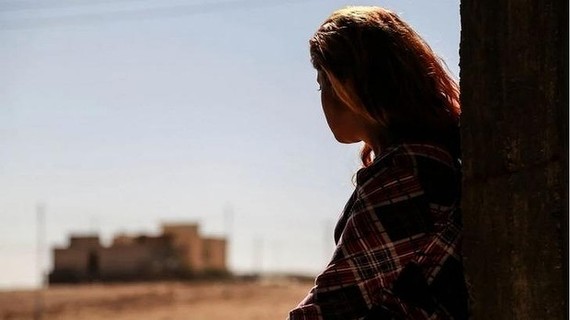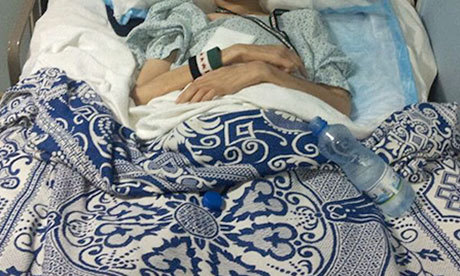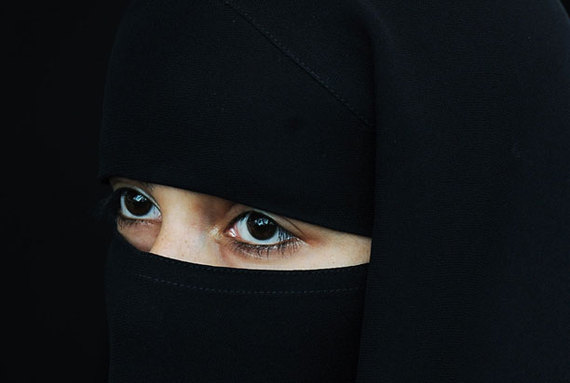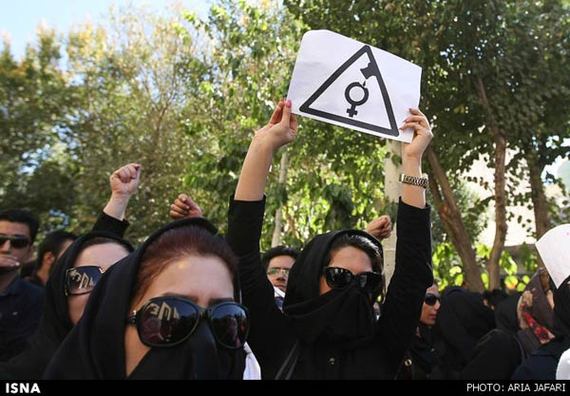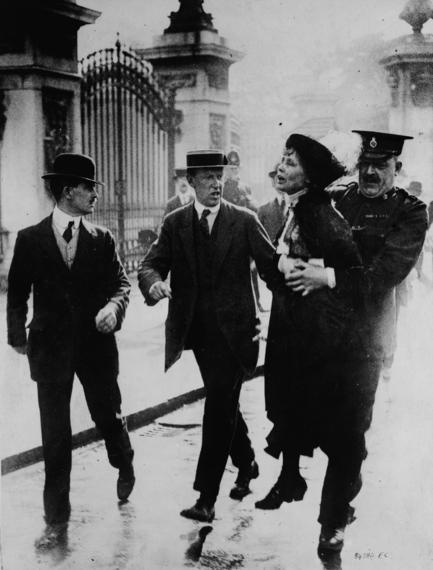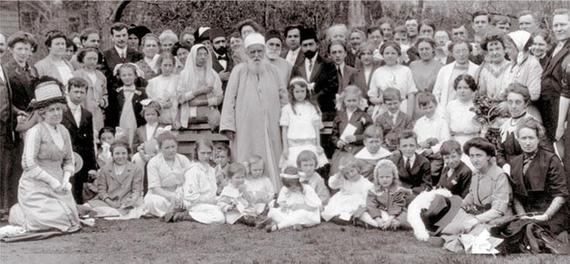$86 American dollars. Somewhere near Mosul in Iraq, a Yazidi woman is sold into "marriage" at that price. That is, if she is between 20 and 30 years of age. If she is 10 to 20 years of age, the price is higher, at $129 dollars. The highest price of $172 is reserved for girls up to the age of nine. These Yazidi women were abducted by Daesh from Mount Sinjar a few months ago as "spoils of war." Fourteen-year-old Narin was given as a "gift" to Abu Ahmed, a 50-year-old commander in Fallujah. Using her wits, she escaped to Baghdad from where she was reunited with her family near Erbil. Now she worries for her captive sister-in-law that she believes is still alive, and dreams that one day they will be reunited again.
Not far away, in Syria, Alma Abdulrahman's nightmare began in a detention centre in Damascus on 29 April 2011. She was accused of being an anti-Assad rebel, brutally beaten, and repeatedly raped by soldiers, who taunted her with cries of "here is the freedom that you wanted." The women, she explains, were all blindfolded and a man that she calls the "boss" would sit in front of the rapists, teaching them "exactly what to do and say to us," encouraging them to take their "portion." Today, Alma tells her harrowing story from a hospital bed in Amman, Jordan, her voice fading in and out, because of the morphine that keeps her pain at bay. She is unable to move her body below her diaphragm, because her neck bones were broken from the beatings. Yet she is brave, and defiant. "We have to share this with the entire world to show that women are fighters," she says. "The Arab woman is very strong. All she needs is just a little freedom."
In Saudi Arabia, Fatimah describes how in 2010, at 12 years of age, she was sold into marriage by her own father, an unemployed drug-addict. Her husband was a 50-year-old man who already had a wife and 10 children. He gave her a playstation as a wedding gift. Fatimah was a brave and strong girl. With the help of her uncle, she recently obtained a divorce in an attempt to reclaim her life. Her case caused outrage and led to efforts by Saudi Arabia's Justice Ministry to ban child marriages by raising the minimum age to 16.
By contrast, in Iran, the Guardian Council has rejected legislative proposals to increase the age of marriage from 13 to 15 years. Even girls as young nine may be married by permission of a court. These backward laws are a reflection of the wider misogynist policies that characterize contemporary Iran. Just recently, in December 2014, in the city of Jahrom, a 22-year-old Basiji militiaman, Mohammad Beheshtifar, was arrested for stabbing several young women. This followed acid attacks in Isfahan against several young women whose faces have become permanently disfigured. One of the victims, Maryam, was driving with her windows pulled down, when a man on a motorcycle threw nearly two liters of acid on her face, hands, and body, before speeding away. The Islamic Republic has repressed public protests by women and insists that these attacks have nothing to do with the climate of hatred against women that are "bad hijab." Meanwhile, the parliament is deliberating on its "Plan to Promote Virtue and Prevent Vice" which includes a role for the Basiji militia, such as Mohammad Beheshtifar of Jahrom, to ensure strict compliance with the hijab. Human rights champion Nasrin Sotoudeh remarks that if this bill is passed "those who engage in violence against women will certainly feel that they have protection."
These are glimpses of the grim reality of women in the Middle East, an affront to the dignity of women everywhere. But women's rights are not just a women's problem. Such violence is equally a source of profound shame for every man whose manhood is not dependent on repression of women. Sadly, too many men live in a cage of male rage. Too many are terrified of the feminine attributes of caring and empathy, lurking beneath their empty projections of masculine triumphalism. Such men desperately hide their vulnerability behind aggression.
The conception of equality as a power struggle between men and women is misguided. The path of liberation is about understanding the inextricable interrelationship between the masculine and the feminine, different aspects of our own self that must find a harmonious balance to complete a human identity. This perspective was part of my childhood upbringing in Iran. Being raised in a Bahá'í family, we had all memorized this teaching on equality written by 'Abdu'l-Bahá (1844-1921), a central figure in our early history, to whom we looked as an example:
The world of humanity has two wings -- one is women and the other men. Not until both wings are equally developed can the bird fly. Should one wing remain weak, flight is impossible. Not until the world of women becomes equal to the world of men in the acquisition of virtues and perfections, can success and prosperity be attained as they ought to be.
In 1853, when he was just eight years old, 'Abdu'l-Bahá was exiled to the Ottoman Empire with his family following anti-Bahá'í massacres jointly instigated by the Persian monarchy and fanatical Islamic clerics. In 1908, almost 60 years later, he was finally freed from prison, now an elderly man, and travelled to the West. When his ship arrived in New York harbor on 11 April 1912, one of the many journalists that were present asked him: "What is your attitude toward woman suffrage?" At this time, the arrest and hunger strike in London of the famous women's rights activist Emmeline Pankhurst was big news. In this context, 'Abdu'l-Bahá responded that: "The modern suffragette is fighting for what must be... If women were given the same advantages as men, their capacity being the same, the result would be the same." One can only imagine the impression that this made in the eyes of the Americans that had gathered on that day in 1912 to greet this prophet of peace from the east. Here was a man from the Islamic world of the early twentieth century who championed the cause of women's rights, still a radical proposition in the Western world!
The arrest of Emmeline Pankhurst in London
With remarkable historical foresight, 'Abdu'l-Bahá situated the shifting balance between masculine and feminine identities in the broader context of a global transition from a civilization based on aggression to one based on intuition and empathy:
The world in the past has been ruled by force, and man has dominated over woman by reason of his more forceful and aggressive qualities both of body and mind. But the balance is already shifting; force is losing its dominance, and mental alertness, intuition, and the spiritual qualities of love and service, in which woman is strong, are gaining ascendancy. Hence the new age will be an age less masculine and more permeated with the feminine ideals, or, to speak more exactly, will be an age in which the masculine and feminine elements of civilization will be more evenly balanced.
'Abdu'l-Bahá in America Seventy years later, in 1982, the Harvard psychologist Carol Gilligan published the groundbreaking In a Different Voice: Psychological Theory and Women's Development. Her theory of moral development maintained that women think and speak differently than men when confronted with ethical dilemmas: "In the different voice of women lies the truth of an ethic of care, the tie between relationship and responsibility, and the origins of aggression in the failure of connection." Therein we see how what she calls "the failure of connection," the inability to form deep emotional bonds, gives rise to fear of intimacy, and male aggression. In this light, violence is the polar opposite of empathy: the man whose manhood is dependent on violence against women, lives in fear of the power of his own feminine self.
Our aspiration to achieve the emancipation of women therefore begins not in the debates of the United Nations, or in the academic ivory tower, but first and foremost, in our own communities, in our intimate relations with others. It is those basic attitudes and conceptions that become the foundation of power, replicated in the violence that we witness in today's world. The Narins, Almas, Fatimahs, and Maryams of this world, remind us of the horrific consequences of a conception of manhood that depends on the subjugation of women for self-affirmation. It is thus for us men to redefine manhood, not as aggression, but as a self that is so strong and confident, that it is not in need of dominating others. In this way, the liberation of women, and the liberation of men, becomes a single, indivisible transaction, that goes to the core of what it means to be fully human.
